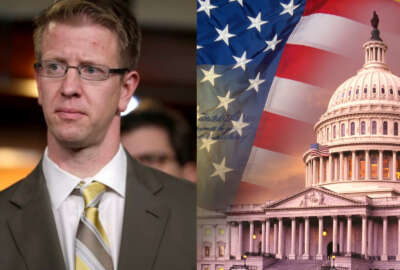What can Katherine Archuleta do for feds?
President Barack Obama recently nominated the manager of his re-election campaign to head up the Office of Personnel Management. But who is Katherine Archuleta and...
wfedstaff | April 17, 2015 5:02 pm
President Barack Obama recently nominated Katherine Archuleta to become director of the Office of Personnel Management.
The president is very familiar with Archuleta’s leadership experience. She ran his re-election campaign, and before that, she was the chief of staff for former Labor Secretary Hilda Solis.
But perhaps no one knows Archuleta better than Federico Pena. She was his chief of staff when he was mayor of Denver and later when he was Transportation Secretary in the Clinton Administration.
“I would introduce Katherine Archuleta as someone who has extraordinary both public and private sector experience, someone who is very mature, well-balanced in her thinking, someone who has experience both at federal agencies and local government and also the private sector, and someone who has dealt with many complex issues over decades,” Pena told the Federal Drive with Tom Temin and Emily Kopp Thursday. 
“There are lots of very young professionals, who have great ideas, who are well intentioned,” Pena said. “But sometimes, it’s good to have someone in the room who has experienced many different things and who can bring a sense of soberness and reality to very complex issues.”
Leading OPM — A ‘schizophrenic’ challenge
Ron Sanders, vice president at Booz Allen Hamilton and OPM’s first associate director of human resource policy, said the agency presents some unique challenges for a new director.
“It’s an interesting position because, obviously, the director is a political appointee, but a political appointee who’s charged with preserving and protecting an apolitical, non-partisan merit system,” he said. “I think that’s a good thing. I think you need a political appointee running the agency. You want someone who’s going to be responsive to the president and to his or her administration, but it does lead to a bit of schizophrenia. Because, while you want that person to be responsive to the government of the day, their institutional responsibility is all about ensuring that the career civil service is protected from political influence.”
During his time at OPM, Sanders watched different OPM directors deal with that unique challenge.
“I wouldn’t say they struggled with it, but it does require some careful thought to balance the responsiveness to the administration on one hand and preserving, protecting the merit system on the other,” he said. “You juxtapose that with all of the other challenges that a new OPM director will face today and that makes for an interesting job description.”
Achuleta’s immediate concerns at OPM will be two-fold, Sanders said. The first one is intangible — restoring the morale of the career service. The second is facing a list of policy and technical challenges aimed at improving the civil service system.
“The list is as long as my arm, whether it’s the pay setting process or the classification system, performance management, dispute resolution, hiring, although some progress has been made there,” Sanders said. “All the pieces and parts of that system need to be retooled and modernized. … It is a target rich environment for reform.”
John Palguta, vice president for policy at the Partnership for Public Service, agreed with Sanders’ description of OPM as being “schizophrenic” regarding its statutory charter.
“Congress has assigned OPM the role of being an overseer, making sure that all the civil service laws are being met, but it also has to be a management adviser,” he said. “It’s the president’s personnel adviser, if you will. So, you’re going into agencies and saying, ‘OK, we’re here to help you, but we’re also going to make sure you do things right.'”
In addition, Palguta said any OPM director has to make sure “the trains run on time.”
“She’s going to have her hands full right away on the federal retirement applications,” Palguta said. “There’s a retirement surge. There’s a big backlog. The sequester’s not helping. So, that’s one thing, and there are other fires to fight, but then there are going to be the strategic objectives that she has to deal with.”
Facing the Senate approval process
Of course, Archuleta doesn’t have the job yet. Here biggest hurdle may be the first one she encounters — the Senate approval process.
“They’re going to want to know what is she going to do to get federal pay and benefits under control, if you will,” Palguta said. “And of course, any OPM director has many different constituents. Congress is one, but within the executive branch you have political appointees, managers, unions, the veterans service organizations, job applicants, the public. So, Congress is going to want to know, during her confirmation, ‘What are you going to do about existing problems? How are you going to handle the retirement application backlog?’ They’re also going to want to know, ‘How are you going to handle the challenges going forward?’ This gets to the strategic and proactive part of the job.”
Because of Archuleta’s background, Palguta said Congress will likely want to know how she would balance the rights of employees versus the rights of the government and the public.
“I don’t think those things are mutually exclusive, but they’re going to want to know what balance is she going to bring to this,” he said. “We’ve got a very divided Congress right now, so you have members of Congress who have very different notions about what should be going on in terms of managing the government workforce and it could be some very tough questions.”
The good news, according to Palguta, is that Archuleta has the political skills necessary to weather the approval process.
“She was chief of staff in two agencies,” he said. “She was a national political director. I think she can handle herself well in front of Congress. … The more important thing is I think she’ll be confirmed and is she going to be up to handling the job of OPM director? I think she will be. It’s not going to be easy.”
Pena agreed that Archuleta is up to the challenge.
“I have no reservation about her testifying before the Congress and working with members of Congress,” he said. “It’s something that she’s done and I think she’ll do an exceptional job for the American people.”
RELATED STORIES:
Obama to nominate Katherine Archuleta as next OPM director
Copyright © 2024 Federal News Network. All rights reserved. This website is not intended for users located within the European Economic Area.
Michael O’Connell is senior digital editor of Federal News Network optimizing content for the best user experience. Follow @moconnellWFED
Follow @moconnellWFED






